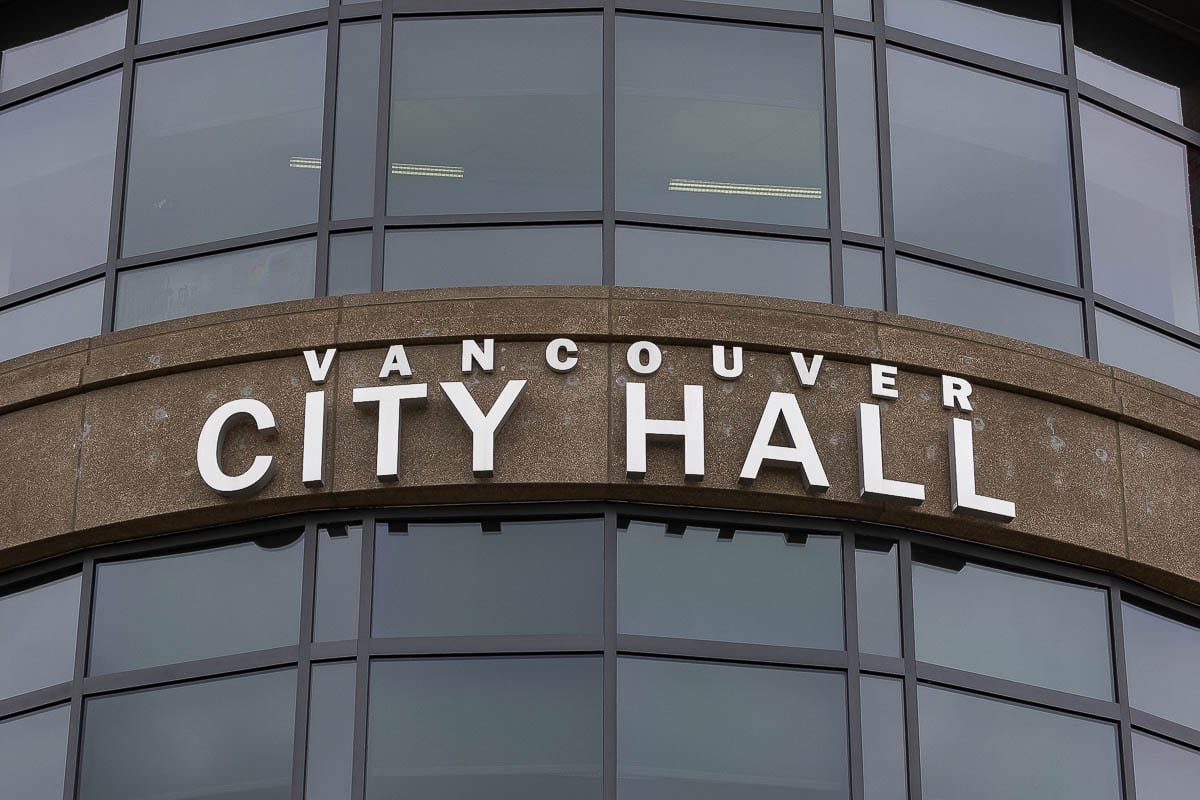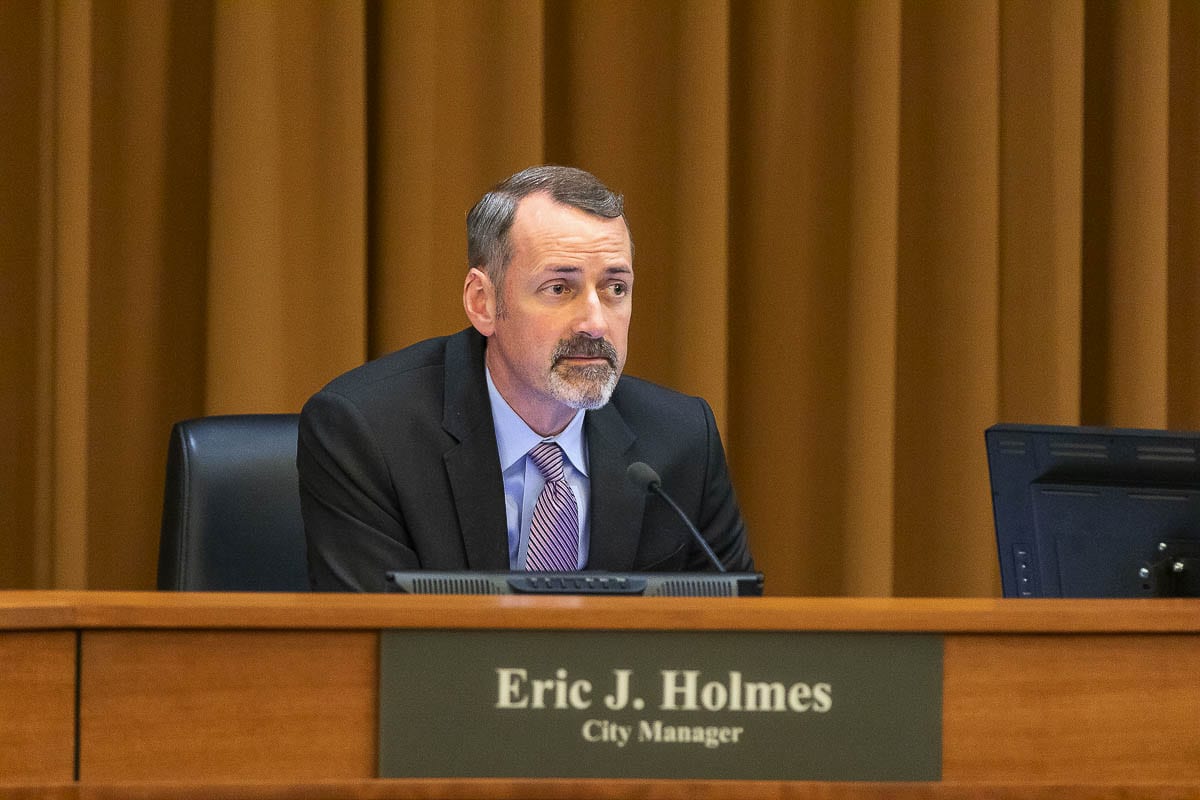Monday’s hearing included public comments critical of the continued funding for Vancouver Police Department
VANCOUVER — Members of the Vancouver City Council on Monday unanimously approved the first reading of a new two-year, $1.3 billion budget, sending it to a second reading, public hearing, and possible final vote at their Nov. 16 meeting.

While the budget is 3.2 percent less than the previous biennium, it is far less than City Manager Eric Holmes had anticipated earlier this year as the COVID-19 pandemic shut down businesses and cost the city millions in lost revenue.
Holmes’ recommended budget anticipates revenue declines of $4 million in each of the next two years, well below the anticipated $27 million two-year budget decline expected earlier in the year.
“The amount of economic uncertainty during the budget development process has been unprecedented,” Holmes wrote in his budget report, “with the economy coming out of the deepest recession due to the pandemic and a high continued level of uncertainty related to changes in the spending patterns of society and the continued level of federal support of the economy.”
While the budget provides for the addition of 15 full-time employees in the next biennium, 20 other positions currently vacant will remain frozen unless revenue increases quicker than anticipated.
To address shortfalls, the city would use approximately $57 million in existing cash reserves for capital projects and one-time initiatives.
The recommended budget would also raise new revenue through several tax and fee increases, most notably a 0.60 percent property tax levy increase, anticipated to generate $300,000 in additional general fund revenue. The tax impact on a home valued at $400,000 would be approximately $4.33 in 2021.
More costly for many residents will be rate increases for water, sewer, garbage, and recycling. Water and stormwater rates would rise by 5 percent each of the next two years, with sewer rates increasing three percent each year and solid waste collection increasing approximately 2.4 percent. The overall added expense per household is estimated to be around $4.24 per month in 2021, and nearly $4.50 a month in 2022.
The city is also able to take advantage of a new state law, which allows it to keep .01 percent of the state sales tax to use for affordable housing projects. Holmes estimates that will raise between $4.2-4.5 million to be used for housing available to people making less than 60 percent of the county’s median income.
While 60 percent of that funding must be used for new housing units, the balance could be used to provide for new mental health treatment, and housing-related services.
The proposed budget also includes a 25 percent increase in park impact fees (PIFs) for 2021, and a further 25 percent increase in 2022. That’s expected to generate another $500,000 next year, and $1.1 million in 2022 for use in building new parks, or improving existing ones.
The city also wants to implement a 5 percent fee increase for fire and life safety inspections, as well as fire plan reviews and new construction inspection fees. The anticipated new revenue would amount to around $50,000.
Police funding draws criticism
While most city departments were asked to trim around 3 percent from their budgets, the Vancouver Police Department will see its operations and administrative budget increase by around $3 million, to $58.5 million.
“Public safety uniformed staffing was largely protected from budget reductions to ensure continued community safety,” Holmes wrote in his budget statement.

That decision drew criticism from a handful of community members who signed up to speak during Monday’s public hearing on the budget.
“I would like to see more intentional investments such as providing direct, intentional services for crisis intervention scenarios, mental health support situations, and homelessness,” said Carmen McKibben, one of the people who spoke out. “I would also like to see a full budget view of body cams including the continual maintenance storage capabilities that would be required.”
The city budget would spend $1.5 million to fund a task force, which will be asked to look into the feasibility and cost of introducing body worn cameras to the Vancouver Police Department.
The city of Portland has moved to reassign millions of dollars in police funding into social service programs, though their City Council recently decided against a further $18 million cut to the department’s budget.
Cindy Fisher, who has become a community activist on mental health issues due to her son’s struggles, also provided comments to the council.
“We are awakening from a deep and dangerous sleep,” Fisher said.”And it is with that
clarity that we are looking at the proposed budget as a budget of fear, increasing control, and abuse of the power that we have entrusted to you.”
Another speaker, Chelsea Unger, said she felt as if the city’s investment in policing services was a poor use of public resources.
“Why are there not more funds going towards preventative and critical services for mental health and substance abuse?” she wondered. “In my decades long experience, police have not protected or served the interests of unhoused people. On the contrary, the homeless have been criminalized and further marginalized.”
Council members declined to respond to the comments of about a dozen community members at Monday’s meeting, but could decide to make recommendations at their Nov. 16 meeting before voting on the final budget.
Capital project funding focused on one-time expenses
The city manager’s $300 million capital projects budget would focus primarily on short-term expenditures and one-time projects.
Among those would be $11 million for a new police department headquarters on Chkalov Drive, $20 million to upgrade Water Station 5 in central Vancouver, and $19 million for Southeast First Street upgrades. The city has also budgeted $2 million for the long-delayed Westside Bike Mobility project, focusing on the first phase of the Columbia Street corridor.




